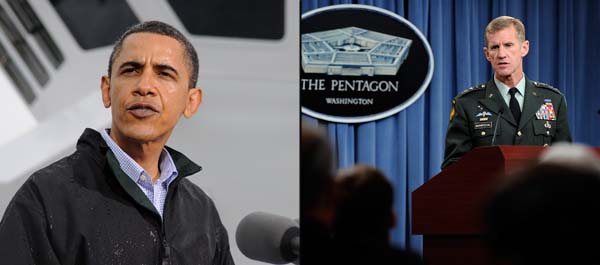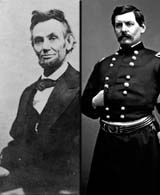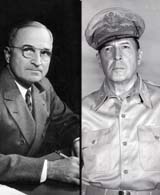Gen. McChrystal’s Firing: Déjà Vu All Over Again?

Even before President Barack Obama fired General Stanley McChrystal on June 23 – OK, technically the general tendered his resignation and the president accepted; but he was fired, folks – media pundits breathlessly compared the Obama-McChrystal situation with earlier and much more famous examples of American presidents firing generals. Two historic examples lead the list: President Abraham Lincoln sacking Army of the Potomac commander, General George McClellan in 1862 during the Civil War; and President Harry Truman’s firing of General Douglas MacArthur during the Korean War in 1951. Superficially, both historical examples seem to have much in common with Obama’s firing of his top general in Afghanistan after the latter’s intemperate remarks went public in a Rolling Stone magazine feature: popular general publicly “disses” less popular president; president gathers his courage and sacks general. Yet, is the Obama-McChrystal incident really “déjà vu all over again?” Here’s the story of the two most-cited historic examples; readers may judge for themselves whether the comparisons are appropriate.
{default}LINCOLN-MCCLELLAN 1862
 Union Army of the Potomac commander, George B. McClellan’s disdain for his commander in chief, Abraham Lincoln, was hardly a secret. The diminutive general with the outsized ego frequently referred to Lincoln in derogatory terms (such as “ape” and “gorilla”), and genuinely thought the president out of his depth in holding the nation’s highest office, particularly in wartime. The widely popular McClellan even suggested – apparently he was serious – that the country would be better off if he, himself, was made dictator until the Union won the war. In one famous incident, Lincoln went to McClellan’s house to see the general but was told that McClellan was not in. Lincoln patiently waited in the general’s parlor for his return. When “Little Mac” came home and was told the president was waiting to see him, McClellan promptly went to bed. The fact that Lincoln didn’t immediately send the general packing is not only a testament to the president’s patience but a stark reminder that the Union Army general officer “talent pool” in the early years of the Civil War was exceedingly shallow (Lincoln at that time had no “Petraeus” waiting in the wings).
Union Army of the Potomac commander, George B. McClellan’s disdain for his commander in chief, Abraham Lincoln, was hardly a secret. The diminutive general with the outsized ego frequently referred to Lincoln in derogatory terms (such as “ape” and “gorilla”), and genuinely thought the president out of his depth in holding the nation’s highest office, particularly in wartime. The widely popular McClellan even suggested – apparently he was serious – that the country would be better off if he, himself, was made dictator until the Union won the war. In one famous incident, Lincoln went to McClellan’s house to see the general but was told that McClellan was not in. Lincoln patiently waited in the general’s parlor for his return. When “Little Mac” came home and was told the president was waiting to see him, McClellan promptly went to bed. The fact that Lincoln didn’t immediately send the general packing is not only a testament to the president’s patience but a stark reminder that the Union Army general officer “talent pool” in the early years of the Civil War was exceedingly shallow (Lincoln at that time had no “Petraeus” waiting in the wings).
Yet, despite McClellan’s widely-known and ill-concealed contempt for Lincoln, the general’s “dissing” of the president was not what finally convinced Lincoln to fire him on November 5, 1862. Lincoln fired McClellan because he failed consistently to produce results on the battlefield. Indeed, Lincoln had already “fired” McClellan once before for battlefield failure – in the wake of McClellan’s incompetently-conducted March-July 1862 Peninsula Campaign during which McClellan “snatched defeat from the jaws of victory” at the gates of Confederate capital, Richmond.
Known as a brilliant organizer and trainer with a (largely undeserved) reputation as America’s “Young Napoleon,” McClellan time and again proved reluctant to risk his reputation by actually fighting. His leadership during and after the September 1862 Battle of Antietam was the final straw for Lincoln. Even though a stroke of incredibly good fortune put a copy of Confederate General Robert E. Lee’s campaign plan in his hands, McClellan fumbled the chance of a lifetime by moving slowly, tentatively fighting the Antietam battle to a draw (McClellan let it degenerate into a bloodbath despite having overwhelming numerical superiority), and failing to follow up aggressively when Lee’s heavily outnumbered army ended the battle trapped in Maryland with the Potomac at its back. Lee escaped to fight another day – and draw out the Civil War for two-and-a-half more bloody years.
Lincoln finally had had enough. Although he likely would have continued to endure McClellan’s personal insults if the general had won victories (apparently Lincoln was not as thin-skinned as some in the current presidential administration), Little Mac failed where it really mattered most to the president – on the battlefield.
TRUMAN-MACARTHUR 1951
 America has known few generals as popular in their time as Douglas MacArthur. America has never known a president as unpopular as Harry Truman (at least since systematic public opinion polling began during President Franklin D. Roosevelt’s administration in the 1930s). In 1952, a year after Truman fired MacArthur, his public approval rating fell to 22-percent, the lowest of any American president in history (for comparison, Barack Obama’s latest approval rating – June 9, 2010 — is 44-percent, his lowest but about twice Truman’s low point; Richard Nixon’s hit 24-percent in the wake of the Watergate scandal, and George W. Bush bottomed out at 25-percent after the November 2008 election). Given the widespread, angry and sustained public outcry after Truman’s April 11, 1951 relief of MacArthur from his Korean War command, it seems likely that had the general’s public opinion numbers been collected then, they may have been three or four times what Truman polled. So, why would an unpopular president fire an extremely popular field commander in the middle of a war? Despite the prodigious efforts by Truman partisans and apologists over the years to frame the firing solely as a constitutional issue (presidential exercise of civilian supremacy over the U.S. military to put an insubordinate general in his place), the truth is that “Give ‘Em Hell” Harry simply got mad.
America has known few generals as popular in their time as Douglas MacArthur. America has never known a president as unpopular as Harry Truman (at least since systematic public opinion polling began during President Franklin D. Roosevelt’s administration in the 1930s). In 1952, a year after Truman fired MacArthur, his public approval rating fell to 22-percent, the lowest of any American president in history (for comparison, Barack Obama’s latest approval rating – June 9, 2010 — is 44-percent, his lowest but about twice Truman’s low point; Richard Nixon’s hit 24-percent in the wake of the Watergate scandal, and George W. Bush bottomed out at 25-percent after the November 2008 election). Given the widespread, angry and sustained public outcry after Truman’s April 11, 1951 relief of MacArthur from his Korean War command, it seems likely that had the general’s public opinion numbers been collected then, they may have been three or four times what Truman polled. So, why would an unpopular president fire an extremely popular field commander in the middle of a war? Despite the prodigious efforts by Truman partisans and apologists over the years to frame the firing solely as a constitutional issue (presidential exercise of civilian supremacy over the U.S. military to put an insubordinate general in his place), the truth is that “Give ‘Em Hell” Harry simply got mad.
While, McChrystal’s (and his staff’s) intemperate publicized remarks “dissing” President Obama, Vice President Biden and Obama administration officials precipitated the general’s firing, in 1951 the “dissing” came from the White House. Long before Truman fired MacArthur, he constantly called him “that brass hat S.O.B.” and other names not quite so polite. When the public storm hit after the firing, Truman’s staff gleefully passed along Truman’s “S.O.B.” remarks to the press – many of whom had already heard the president’s intemperate comments. That Douglas MacArthur, whose regal bearing and patrician manners often irritated people like Truman, could be egocentric and overbearing is unarguable.
Yet, Truman had been content to overlook his faults, even his public criticisms, as long as the general was a successful egocentric, overbearing patrician. MacArthur’s brilliant amphibious assault at Inchon in September 1950, undertaken despite stiff opposition from the U.S. Joint Chiefs of Staff, sent the hitherto victorious North Korean army scrambling back across the 38th Parallel demarcation line. Any criticism that MacArthur might have made about Truman’s war policy — the general had sent a personal letter to the Veterans of Foreign Wars that the White House subsequently objected to – was forgiven as his troops smashed the North Koreans and drove to the very border of China. It was only after tens of thousands of Chinese “volunteers” in November 1950 sent UN forces reeling back south of Seoul that the President decided to distance himself from the now-discredited general. Even then, the only “explicit” warning MacArthur received was an innocuous reminder that “all public statements regarding the war must be cleared by the White House,” a seemingly routine message sent to dozens of military commands, not just MacArthur’s, in December 1950. After the VFW letter in September, MacArthur never personally received a direct, explicit warning regarding public statements, nor was he ever given any direct order from the President which he failed to obey.
Truman’s now-famous trip to meet MacArthur on Wake Island in October 1950 is routinely presented by Truman partisans as the President meeting with his recalcitrant general and laying down the law one last time to get him to acknowledge Presidential authority. However, all of the principals at the meeting reported that it was nothing of the kind and the men were friendly and personable. Even the most die-hard Truman supporters who were there admit that MacArthur was respectful and deferential to the President. The oft-mentioned anecdote that MacArthur kept the President waiting on the tarmac while his own plane circled to set up a dramatic entrance simply didn’t happen. Truman neither scolded MacArthur nor did he give him any kind of ultimatum for changing his behavior – in fact, Truman presented MacArthur with a fourth oak leaf cluster to the general’s Distinguished Service Medal. The real reason for the visit was to provide the President with a timely photo-op (sound familiar?) for the November Congressional elections. In October of 1950, the Truman Administration was desperate to get some positive publicity and MacArthur had just finished pulling off Inchon – one of the most brilliant military maneuvers in history. Truman went to Wake Island to be seen in a smiling pose congratulating “his” victorious Korean commander and the photographic record of the meeting clearly shows a beaming Truman patting a respectfully-smiling MacArthur on the back. White House press agents distributed the photograph to every news agency in America.
The accusation that MacArthur was guilty of insubordination by continually and willfully disobeying the direct orders of his superior, the President, as Truman continually implied after the firing, is not supported by the record. Even the Joint Chiefs of Staff – men who despised the general – admitted in sworn Congressional testimony that MacArthur’s conduct was clearly not the military crime of insubordination that Truman later asserted. Truman claimed later that the Joint Chiefs had unanimously approved of his firing of MacArthur. The record, however, shows that they unanimously agreed that, as president, Truman had the right to fire the general (or any general he wanted to fire) – clearly, these are two different issues. In 1956, MacArthur wrote an article in Life magazine presenting his side of the story that fully acknowledged the President’s right to relieve him or any other general of command at any time he wished, but vehemently refuted the insubordination charge. MacArthur wrote that insubordination was never brought up or even mentioned as a reason for his relief, and that, had it been, he would have demanded a court martial in order to clear his name. Although Truman later backed away somewhat from the insubordination charge, he continued to staunchly maintain that he had given the general many chances to correct his recalcitrant behavior and that he was fully justified in relieving MacArthur many months before he actually did so. However, none of these alleged incidents – Truman never specified what they were – could have been justified by the military crime of insubordination. At the time of the relief, Truman chose instead to couch the firing in terms that charged MacArthur was attempting to broaden a regional conflict into “a Third World War” (Truman’s phraseology), not gross insubordination. For his part, the general made it surprisingly easy, with a controversial public announcement calling on his Chinese counterpart to “surrender” (just when the Truman administration was beginning delicate armistice negotiations with China), but more significantly with an ill-considered “private” letter replying to a query by an influential Republican congressman – who promptly made the letter public.
This latter faux pas by MacArthur is the real reason Truman fired him when he did. Harry got roaring mad that by corresponding with his Republican political rivals (with support for the Republicans’ policy positions that they would certainly use against Truman) the general was now interfering in politics. Truman had always believed that when the fighting started, the politicians should leave it to the generals; but he expected the generals to leave politics to the politicians. By appearing to side with his Republican rivals, MacArthur, in Truman’s mind, had crossed the line from military commander into partisan politics – he had to go. Truman lost his temper and MacArthur lost his job.
The Constitution gave Truman all the authority he required to take such action (and MacArthur never subsequently disputed or challenged the fact that the president had the right to relieve him); yet no politician wants to intentionally alienate the electorate by sacking a national hero. Truman wanted his reasons to stand up to public scrutiny, as well as pass muster at the inevitable Congressional hearings. Hence, Truman’s and his supporters’ long-standing public fiction that the firing was because MacArthur had threatened the inviolability of constitutionally mandated civilian control of the military.
The actual firing was accomplished in an unnecessarily petty manner – MacArthur heard of his relief in a radio news broadcast – a bitter and vindictive way to end the career of America’s most distinguished general of the 20th century. Truman’s subsequent remarks show that he was always on the defensive about his action, continually at pains to attempt to show that MacArthur had given him no choice in the matter. Certainly – despite the truth – in the years since 1951 this is how the incident has been officially presented, even to generations of military officers at virtually all levels of schooling and professional development. For the most in-depth, balanced and comprehensive book-length examination of the Truman-MacArthur controversy, read Michael D. Pearlman’s outstanding book, Truman and MacArthur: Policy, Politics and the Hunger for Honor and Renown (Indiana University Press, 2008 – see our review on this website).


Interesting article and makes me wonder if Civilian over military issue is overly used or interpeted.
Other Presidents’ have fired generals. Carter and the CnC in Korea, Clinton and the Air Force General about the missile up the camels butt, Hoover and Billy Mitichell…Hoover and MacArthur, Reagan and Adm. Crowe, Nixon and Westmoreland. Sometime it has been over “PUBLIC” disagreements, abut most often for lack of succcess in getting the job done (such as Lincoln and a list of generals) And in most cases it has been handled through the chain of command…A public/media firing is rare and seemly only when it involves a Democratic President.
It is hard for me to believe that McChrystal did not know that he was engaging in a career ending event. If you criticize up the chain of command you do not do it in front of Rolling Stone if you have any illusions about keeping your job.
On the other hand, a four star whose future out of the Army is already secure and who has certain frustrations about the rules of engagement his troops are forced to recognize might just see a very public event as a means of jumpstarting a sidelined dialogue.
I don’t think the comparison to either of the other “big Macs” bears fruit, they were both egomaniacs whose hubris knew no bounds.
I just wish we had someone with those kind of cajones during Viet Nam.
A well considered article. My only concern is that it repeats the contemporary (and non-informed) comments on MacArthur’s ‘genius’, wiithout taking into account the data that is now widely available. A classic example being that the Inchon Landing ‘forced the retreat’ of the North Korean Army. We now know that the NKA was in fact outnumbered by a factor of 2 to 1 by the United Nations forces and that the ground attacks from the Pusan Peninsula had already forced its withdrawal.
It also does not take into account the advice Truman was getting from all quarters that MacArthur’s perpetual bumbling (understimate Chinese, detached X Corps etc etc) was causing very serious crises of confidence among the Allies and in his subordinate commanders.
David Hughes’ comments are well taken. These points are all addressed in quite some detail in the book I referenced at the end of this web article (Mike Pearlman’s Truman and MacArthur book) and I include some discussion of that (principally the effect of Inchon and MacArthur’s responsibility for getting surprised by the Chinese intervention) in my review which may be accessed by clickiing on the link at the end of this web article